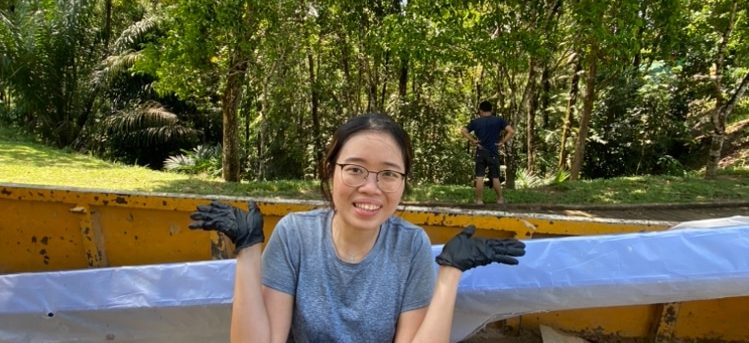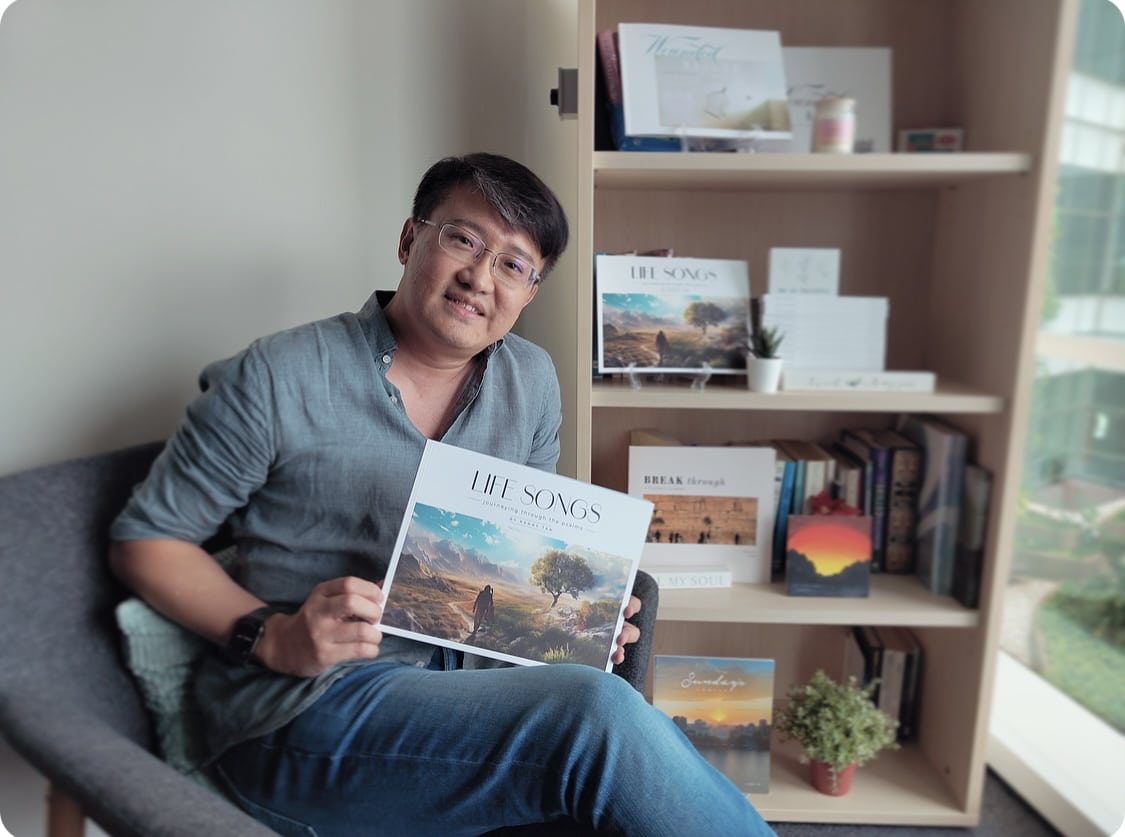“Then and now, God’s always been here for me”: Singapore’s first top military chief General Winston Choo
In celebration of Singapore's 56th National Day, Salt&Light brings you a series on what Home means to our people, both citizens and those passing through.
by Gemma Koh // August 6, 2021, 7:04 pm
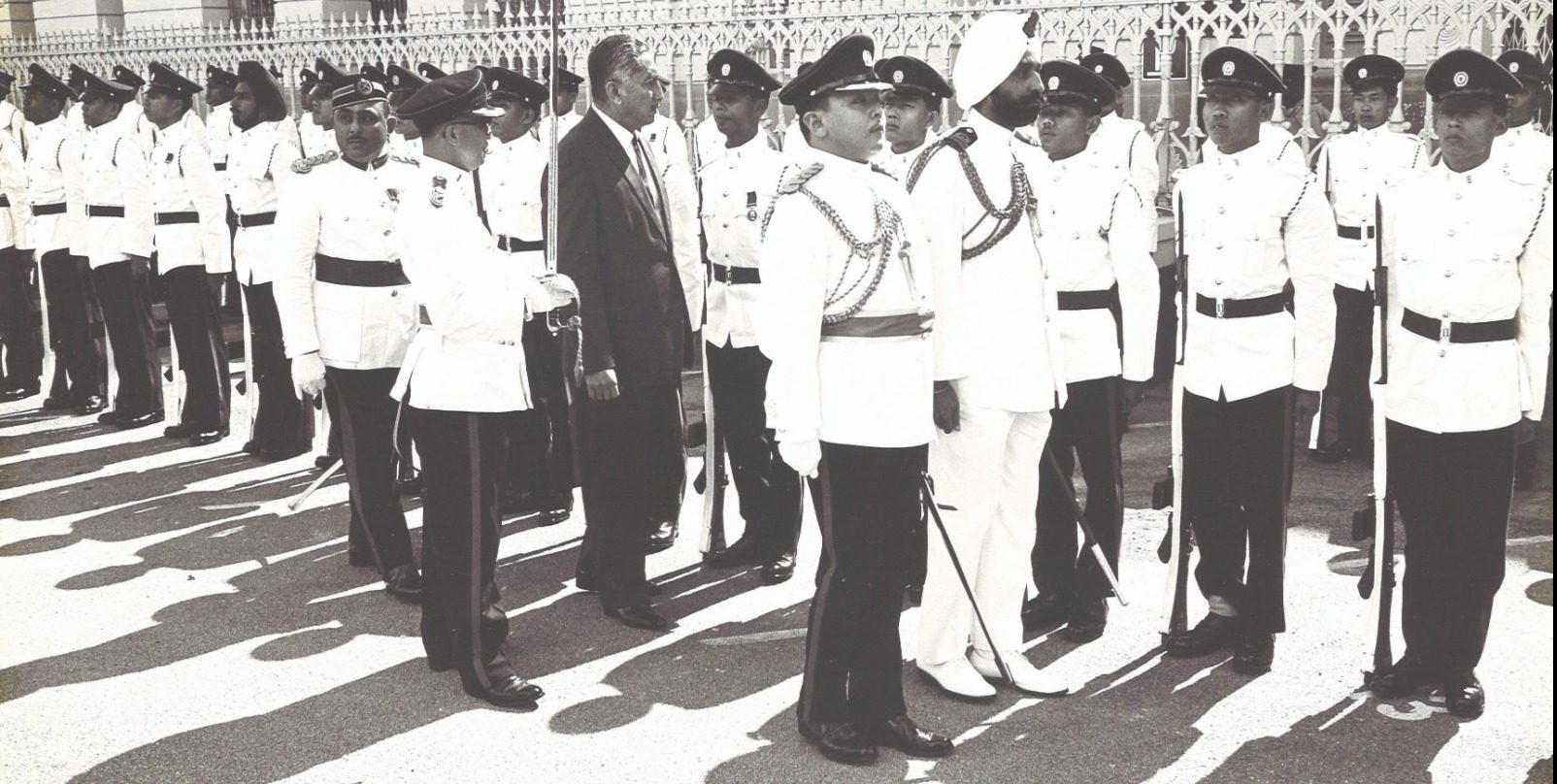
President Yusof Ishak (in suit) inspects the Guard of Honour during the ceremonial opening of Singapore's first sitting of Parliament on December 22, 1965. Winston Choo (front left), was then a Captain and his aide-de-camp. One of Singapore's $50 bills depicts Gen Choo standing beside the President during the historic event. All photos courtesy of the Choo family unless otherwise stated.
When 18-year-old Winston Choo left Singapore for military college in Port Dickson, Malaysia, in January 1960, it was not to serve the nation.
“We had no nation at that time! We didn’t become a nation until 1965, or 1963, depending on how you want to look at it,” Lieutenant-General (Retired) Winston Choo, now 80, told Salt&Light.
(Singapore declared her independence from the United Kingdom on August 31, 1963, and 16 days later joined the Federation of Malaysia.)
Being a soldier was something Gen Choo had set his heart on. “I enjoyed the outdoors, the adventure, the physical activities. I liked the pomp, the discipline, the uniform, and was attracted to the military.
“Being a soldier wasn’t the in thing at that time,” he added. Singapore’s defence was still under the British, and he was prepared to accept the lack of career prospects.
“He parachuted and dived, jogged with his men, and went into the trenches with them. He cared deeply about his soldiers.”
One year into the gruelling training at military college, he was given his first step up the rungs of the military ladder. Subsequently, on his return to Singapore, he was posted to her only battalion in 1961. Then barely 20 years old, he was assigned to command a platoon of professional soldiers who were at least five years older.
He was in the centre ring after Singapore declared independence from Malaysia on August 9, 1965. Prime Minister Lee Kuan Yew instructed that a professional military officer be given the job of aide-de-camp (ADC) to President Yusof Ishak, who handpicked the 24-year-old.
After being called back to the military, he was later groomed – and tested – by Dr Goh Keng Swee (Singapore’s first Minister for the Interior and Defence) to lead the Singapore Armed Forces (SAF).
In May 1974, at age 32, he was placed at the apex of Singapore’s military.
A visiting Australian four-star general would exclaim: “But you are a boy!”
To which he had replied: “General, I may be a boy to you, but I am doing a man’s job.”
Gen Choo recounted these remarkable events in his book, A Soldier at Heart: A Memoir, which was officially released last month (July 16), two days before his 80th birthday.
The young head of the young Armed Forces of the young Republic would hold his ground for Singapore’s interests, but make friends on her behalf with counterparts in other armed forces who were in their 50s – almost twice his age.
Yet unbeknownst to many, the first and longest-serving top military chief of the Singapore Armed Forces answered to a far higher authority.
When Salt&Light visited Gen and Mrs Choo at their home, a cross by their front door, and plaques of Bible verses proclaimed the presence of the true head of their household.
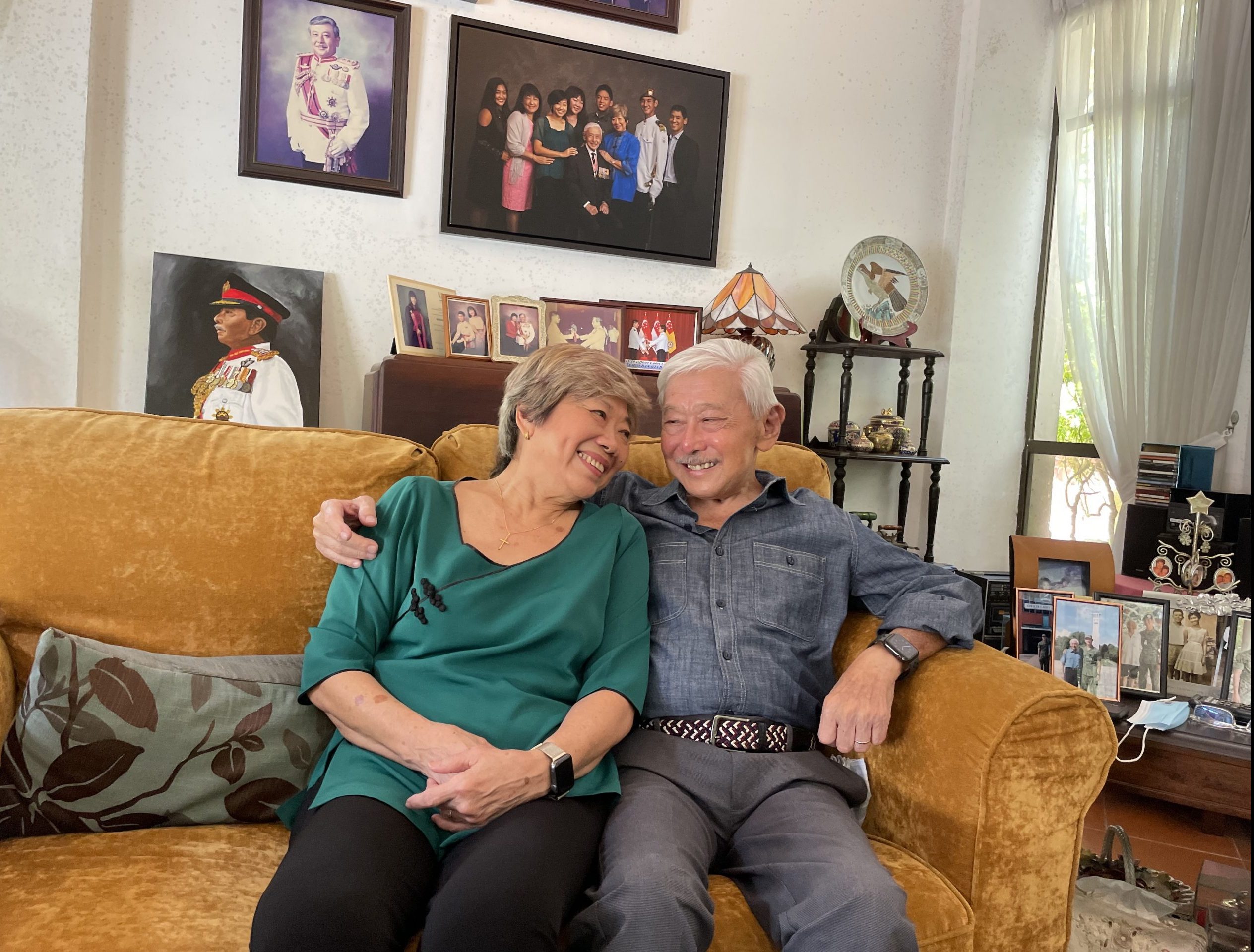
Gen and Mrs Choo, surrounded by portraits of precious people and special moments in their lives. The painting (lower left) of Gen Choo was done by Dana, their eldest grandchild, as a present on his 80th birthday. The Tiffany-style lamp on the piano was made by Mrs Choo. Photo by Gemma Koh.
Mrs Katherine “Kate” Choo (nee Seow), 79, treated this reporter to a taste of what guests to their residence in Australia were likely to have enjoyed when her husband was Singapore’s High Commissioner to the country – genuine hospitality and homemade snacks from family recipes, including the three-layered lapis-like spekkoek and samosas (so delicious!).
Impressive stained glass panels, separating the inner house from the living lounge where we sat, were handmade by Mrs Choo, with the help of her husband. She only had time to take up the hobby plus porcelain painting when her husband was posted to Australia after retiring from the military.
During Gen Choo’s time in the Singapore Armed Forces, she had had her hands full holding the fort on the home front and raising their two children. (Check back soon in Salt&Light for Part 2 of this story).
Gen Choo was 51 in 1992 when he retired from the military after more than 30 years – of which, 18 were as its head. (The last title he held was Chief of Defence Force.)
Mrs Choo’s Christian faith kept the family spiritually strong, and her unwavering support enabled her husband to focus on his mission: Building the foundation of the Singapore Armed Forces, providing our homeland with the confidence and security to flourish.
Choo, not Churchill
Family accounts relate that Gen Choo’s grandfather named him after British Prime Minister Winston Churchill.
While Gen Choo did not mention this in his memoir (“as I did not consider it relevant or important”), his name will go down in history as belonging to one of the most charismatic military leaders of Singapore.
“I was told by my mother that her adopted father, with the agreement of my father, named me Winston, as he admired the British PM Winston Churchill,” he said.
Reading about his formative years (see the extract of his memoir here) and years in the military while thinking about the trajectory of his career, one gets the sense that his steps to – and in – serving Singapore were plotted with a precision that no man could have planned.
“For God and country”: Chaplains carry on tradition of service and faith
It would not be easy. There would be challenges – mistakes even – that would build character with the lessons learnt.
God was equipping him with the skills not just to pass the test that would see him chosen as one of four Singapore cadets to attend military school in Malaysia. But also the EQ, charm, grit and steel to lead and unite men and women from diverse races, creeds and backgrounds in the protection of Singapore.
He went on to have a diplomatic career – that would last almost as long as his time in the military – in roles that included non-resident Ambassador to Israel.
For instance, young Winston was on the path to attending a government secondary school when his grandfather insisted that he attend Anglo-Chinese School (ACS) at Barker Road.
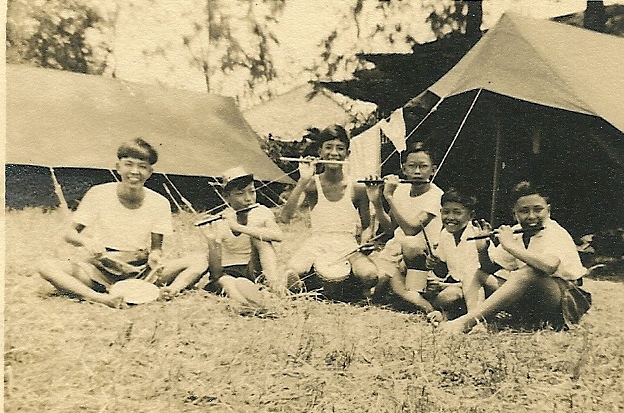
Young Winston (right, pictured with his “band of brothers”) joined the Boys’ Brigade at age 9. He saw it as “God’s gift”. It was where God “planted” in him a love for the outdoors, camping and the camaraderie that attracted him to life in the military.
“I did not at that time see it as God’s intervention,” said Gen Choo.
“But it was a very important intervention which led me into a Christian environment.”
Even though attending chapel on Monday morning was what the cheeky boys called “going into the big bedroom – the auditorium where a lot of boys fall asleep”, he said that “in the midst of this, I absorbed Christian values just as every boy there did”.
Going to ACS also opened the field for him to play a battery of sports – from rugby to football to hockey – where he developed the ability to get people to work towards a common goal.
(Morris) Minor accident
On the playing field, in the jungles, and elsewhere, Gen Choo has survived more than his share of injuries and close shaves.
He recalled to Salt&Light how God kept him out of harm’s way around the age of 16. The accident could have maimed or killed him and derailed his hopes for a military career even before it began.
Six boys had recklessly piled into a Morris Minor belonging to one of the boys. One boy took the wheel.
“I must confess, it was only when danger confronted me that I prayed for protection.”
“I wasn’t driving. But I jumped into the car. It was stupidity or bravado, or whatever.
“When we took the bend, he lost control of the car, and we went into the drain.
“My whole life flashed before me.
“I was on the extreme right with my hand outside the car,” he said, making the motion of placing his hand on the roof of an imaginary car.
His arm was pinned between the car and the drain. “I was stuck until they removed the car.
“I had bruises on my hand. I didn’t break my hand.” Even more miraculously, no one was hurt.
“Funnily enough, the car wasn’t badly damaged and once they picked up the car, the owner drove it home,” he said.
The incident at that time was “written off as a childish prank”. The boys were not charged.
(Note: There are repercussions for those who drive without a licence today.)
The rigors
Winston Choo was baptised as a baby and grew up in a Christian home. All his relatives attended Prinsep Street Presbyterian Church, and he attended Sunday school and youth fellowship.
“So in a way, Christianity was something I took for granted,” he said.
“But Christ was in the back, never in the forefront of my life” when he entered the army, he admitted.
Even if God was not his priority in the years in the army, “it was my upbringing that taught me to look upon Him” later on.
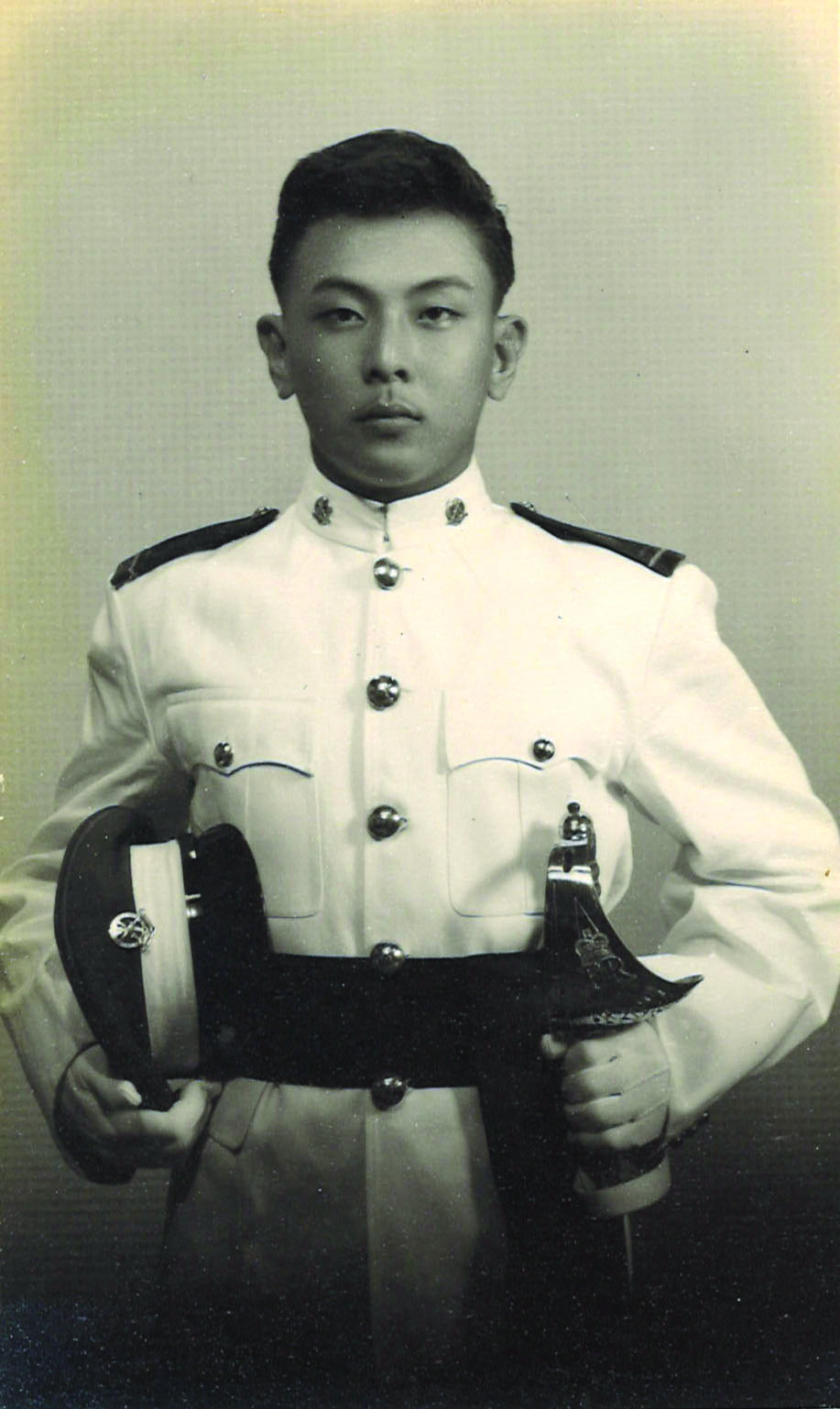
As an Officer Cadet in 1960.
Gen Choo said: “I must confess, it was only when danger confronted me that I prayed for protection. I only prayed when I needed help.”
This included the time when he came down with malaria despite taking anti-malaria tablets and wearing long sleeves while a cadet in Port Dickson, he told Salt&Light.
“At night, I had the rigors,” he said, demonstrating the violent shivers. “I told my roommate not to tell anybody.”
Such was his steely determination to stay in the army, he did not want to show that he was weak or ill, lest he got weeded out. “So I self-medicated.”
In the line of fire
In preparation for deployment to Sabah during the Konfrontasi of the 1960s (Confrontation, Indonesia’s opposition to the formation of the Federation of Malaysia), the troops were sent to Taiping, Malaysia.
Enroute there, a crate of rifle magazines fell off the train. As the baggage officer in charge of them, he could have been charged and court-martialled.
“God please help me,” he quietly begged.
“I was admonished, but not heavily punished,” he said. At that moment, he acknowledged to himself: “God is beside me.”
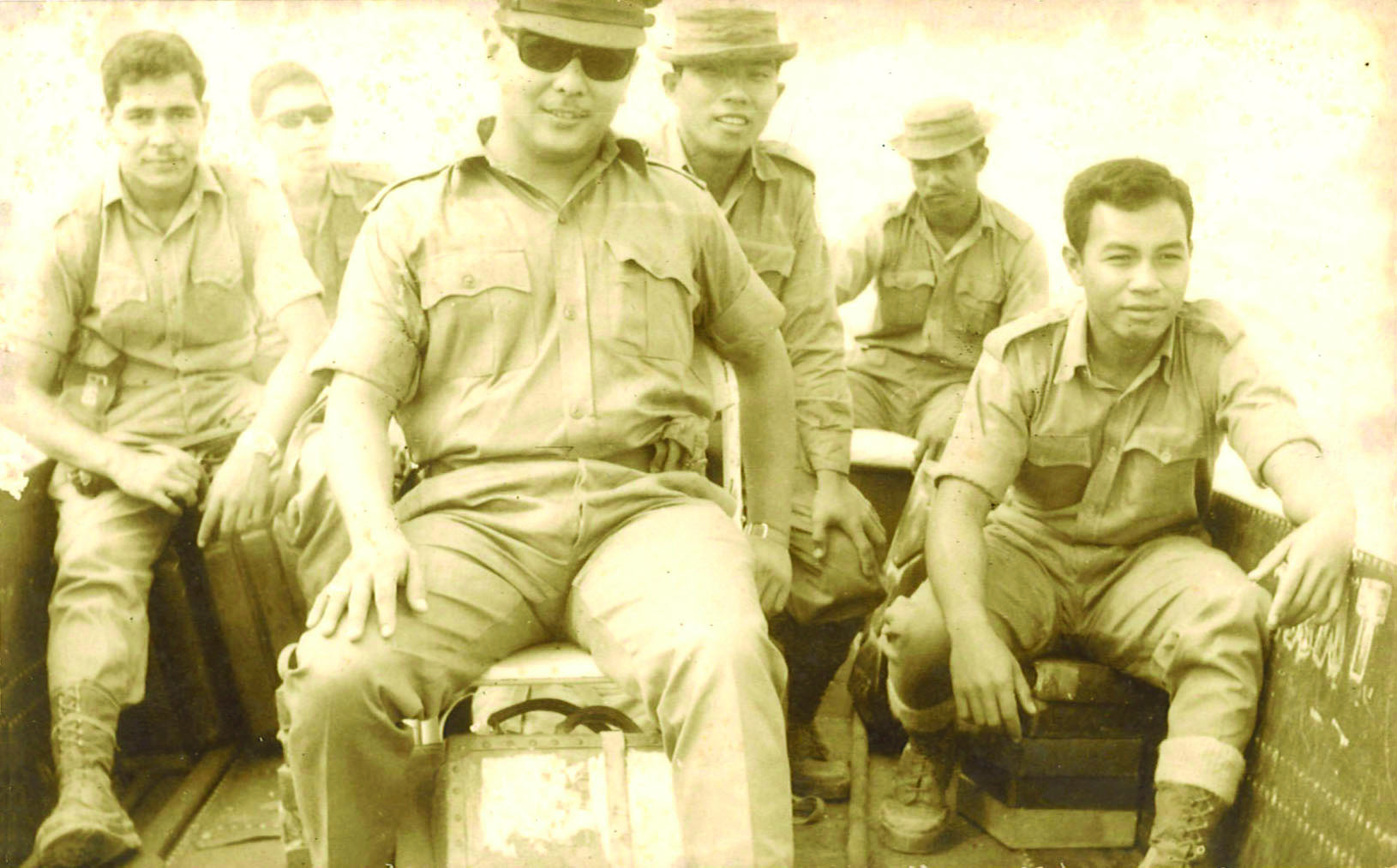
“It never dawned on me that we would get shot – until an officer from the battalion that replaced mine was shot and wounded when he was in the very same assault boat that I had used all the time,” said Winston Choo (front) with signallers travelling to Sebatik in an assault boat during the Konfrontasi in 1964.
He accepted that he had “screwed up”, he wrote in his book.
He learnt a lesson that would stay with him for the rest of his life: “When you are given a responsibility, you must consider every minute detail from the beginning to the end.”
When he was deployed to Sabah, he had told Kate, who was then his girlfriend, that he did not know if he would be coming home alive.
So close and real was the danger, the men slept with loaded weapons.
“When you are given a responsibility, you must consider every minute detail from the beginning to the end.”
“When you meet danger, after sometime, it becomes part of your life.”
Even though he would only pray for help when he needed it, he was confident that his God was walking with him.
While flying very low in light aircraft dropping leaflets as part of psychological operations, “we couldn’t see the bullets or hear the bullets, but we were being fired on”, he recalled.
He had added in his book: “An officer from the battalion that replaced mine was shot and wounded when he was in the very same assault boat that I had used all the time in Sebatik. This happened one day after he took over from us.
“It sent shivers down my spine when I heard about it. It could have been me.”
The heart of a soldier
“General Choo shaped the culture and the values of the SAF,” said Senior Minister and Coordinating Minister of National Security Teo Chee Hean at the launch of A Soldier at Heart.
“Not by issuing orders alone but by himself living and breathing these values.
“Winston Choo epitomised the SAF and led by example. He parachuted and dived, jogged with his men, and went into the trenches with them. He cared deeply about his soldiers, and spent long hours talking with them, listening to their problems, and getting to know them and their families.”
SM Teo is just one of Singapore’s top leaders (Prime Minister Lee Hsien Loong is another) who have served under Gen Choo’s command.
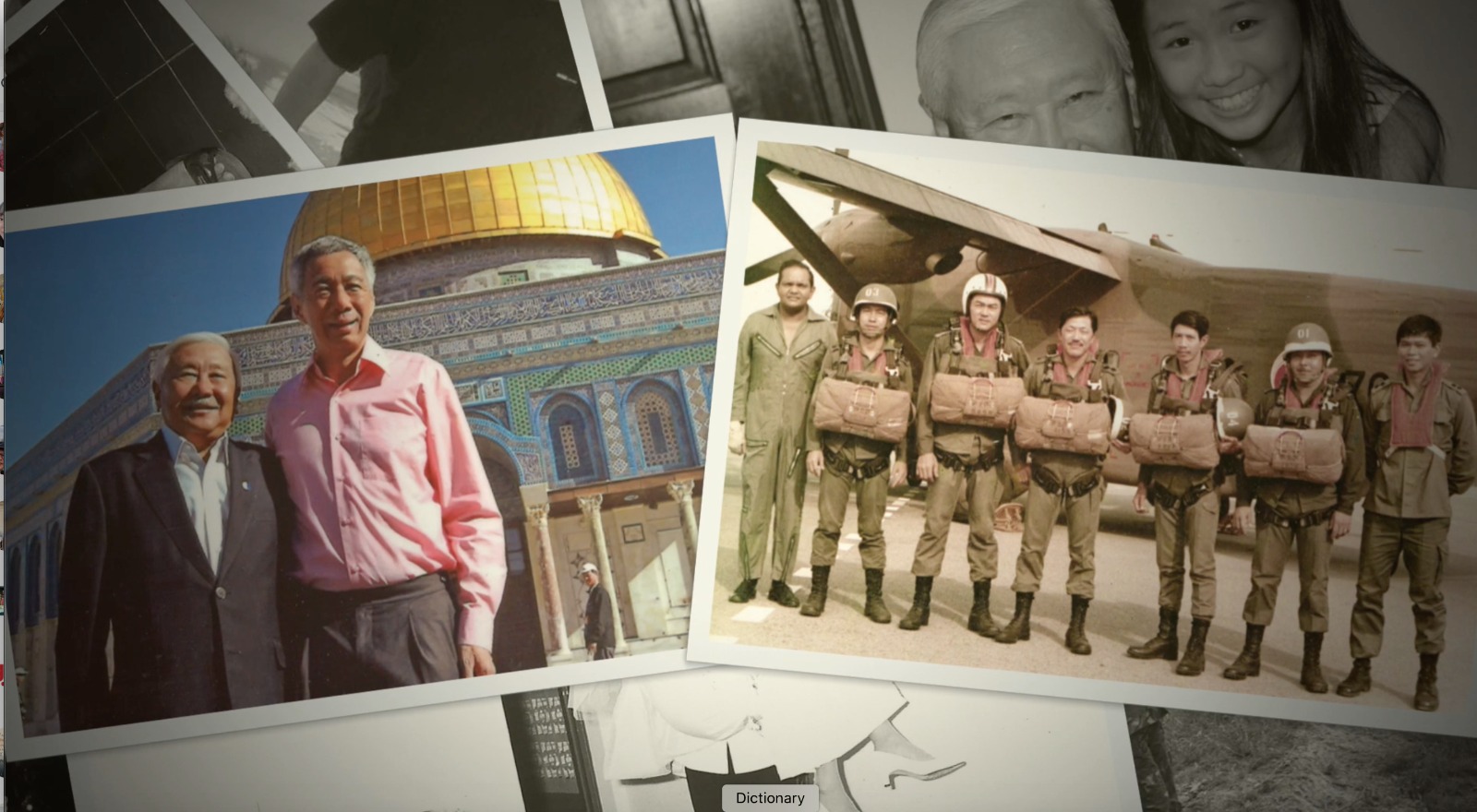
Prime Minister Lee Hsien Loong (in pink) is among Singapore’s leaders who served under Gen Winston Choo in the army. They are pictured at the Dome of the Rock, Temple Mount, Jerusalem, during PM’s official visit to Israel in 2016. The 1976 photo on the right shows then Colonel Choo (second from right, with instructor Lieutenant Ho Soo Jau, on far right) on his first airborne course in 1976.
This heart was evident in military college when he discovered he “enjoyed looking after people”. He took time to calm and assure junior cadets who had a rough time taking the ragging from seniors.
How did he balance the seemingly conflicting aspects of care vs command?
“You must care for your troops, value them, look at them as individuals.” he told Salt&Light. “They are all God’s children.
“But the best way to be kind to them and look after their welfare is to be hard on them in terms of training them well. Because if you don’t train them well, you put them in harm’s way.
“So it’s not a balance. It is easy to do. ‘I care for you, therefore I train you well; I don’t want you to get into trouble.’ It is not mutually exclusive.
“The best way to be kind to them and look after their welfare is to be hard on them in terms of training them well.”
“If you don’t discipline soldiers especially, they won’t do their work properly, and they will not know how to stay alive.
“If you love them, be hard on them. But don’t be hard on them because you want to be hard on them.
“If they know that you care for them, they will do their training, knowing that that is best for them. There is no contradiction in the aims and objective.”
This is best illustrated by an anecdote Singapore’s first three-star general gives in his memoir of being approached by a former rifleman at Ghim Moh hawker centre long after he retired.
The former rifleman said to him: “You know Sir, you were a b*s***d. You were so tough on us, but you cared for us. I will go to war with you.”
The survival of a nation
When Salt&Light asked Gen Choo about the seeming conflict between being a leader of men trained to kill, and the Christian faith which forbids killing of a fellow being, he clarified that soldiers are trained to fight and not to kill indiscriminately.
“Soldiers who kill indiscriminately are punished. Soldiers are trained to fight for a justifiable cause, such as in the defence of, and for the survival of, their country and fellow countrymen.
“In the course of fighting, soldiers kill or be killed.
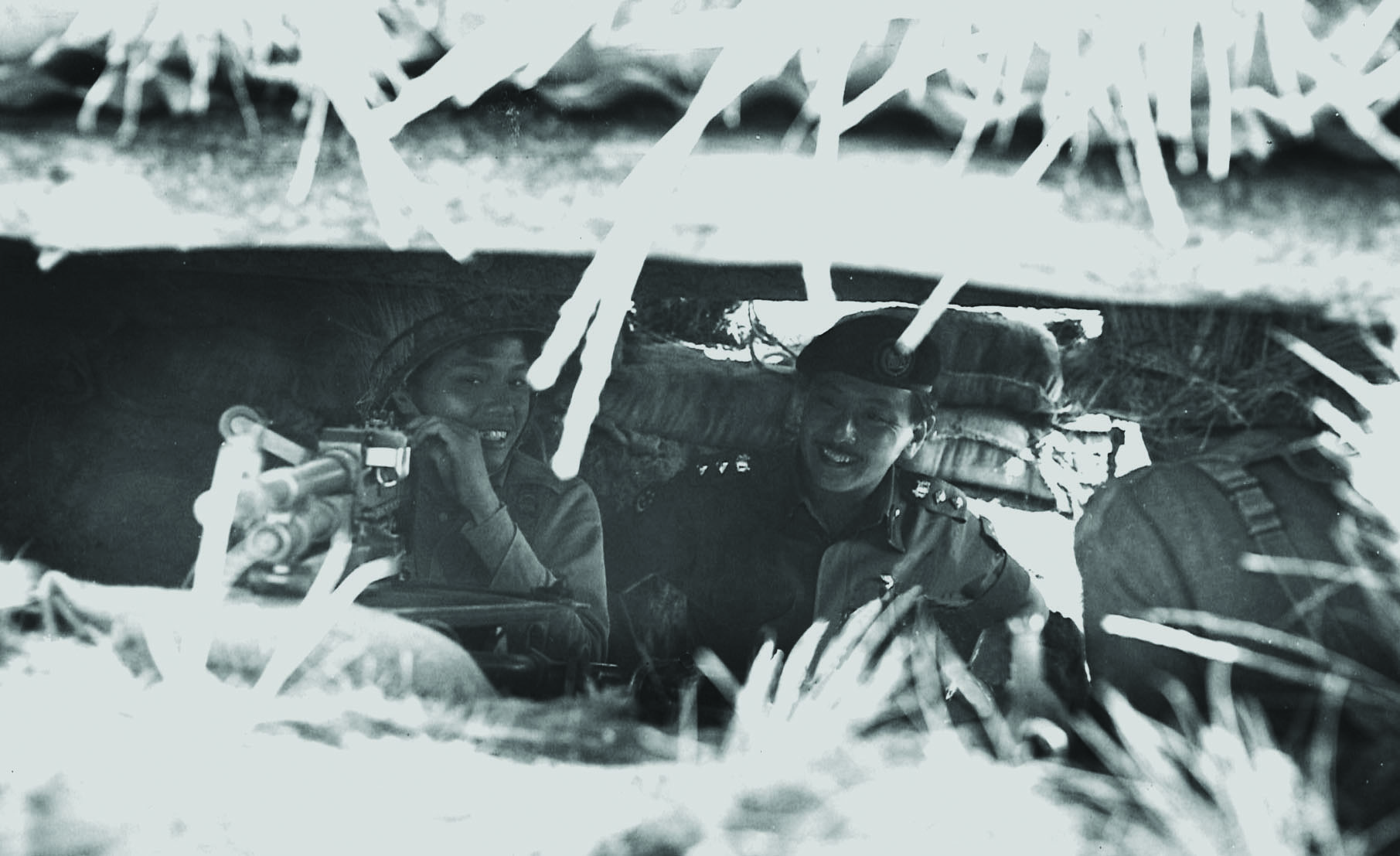
The newly-minted military chief (centre) visits a defence exercise in 1974.
“In the Bible, especially in the Old Testament, there are many accounts where God’s help and guidance was sought for and given in the course of engaging in war and in slaying the enemies.
“When soldiers are trained to fight and kill, they are given opportunities to understand why they fight and the cause. This provides the soldiers with a moral ballast.”
He added: “And no, I have not knowingly killed in combat.”
He said he was not given a chance to correct the statement on a news platform which wrote that he did.
(“But that is why my children and grandchildren have asked me to give them a wide berth,” he said in jest.)
Refuge for grandchildren
It would be a baby who would lead the General to put God in a place of priority.
She is his first grandchild, Dana, who is now 23.
When she was born, Gen Choo thought: ”This is such a beautiful baby. This is my third generation. I must make sure that this child grows up in a Christian home.”
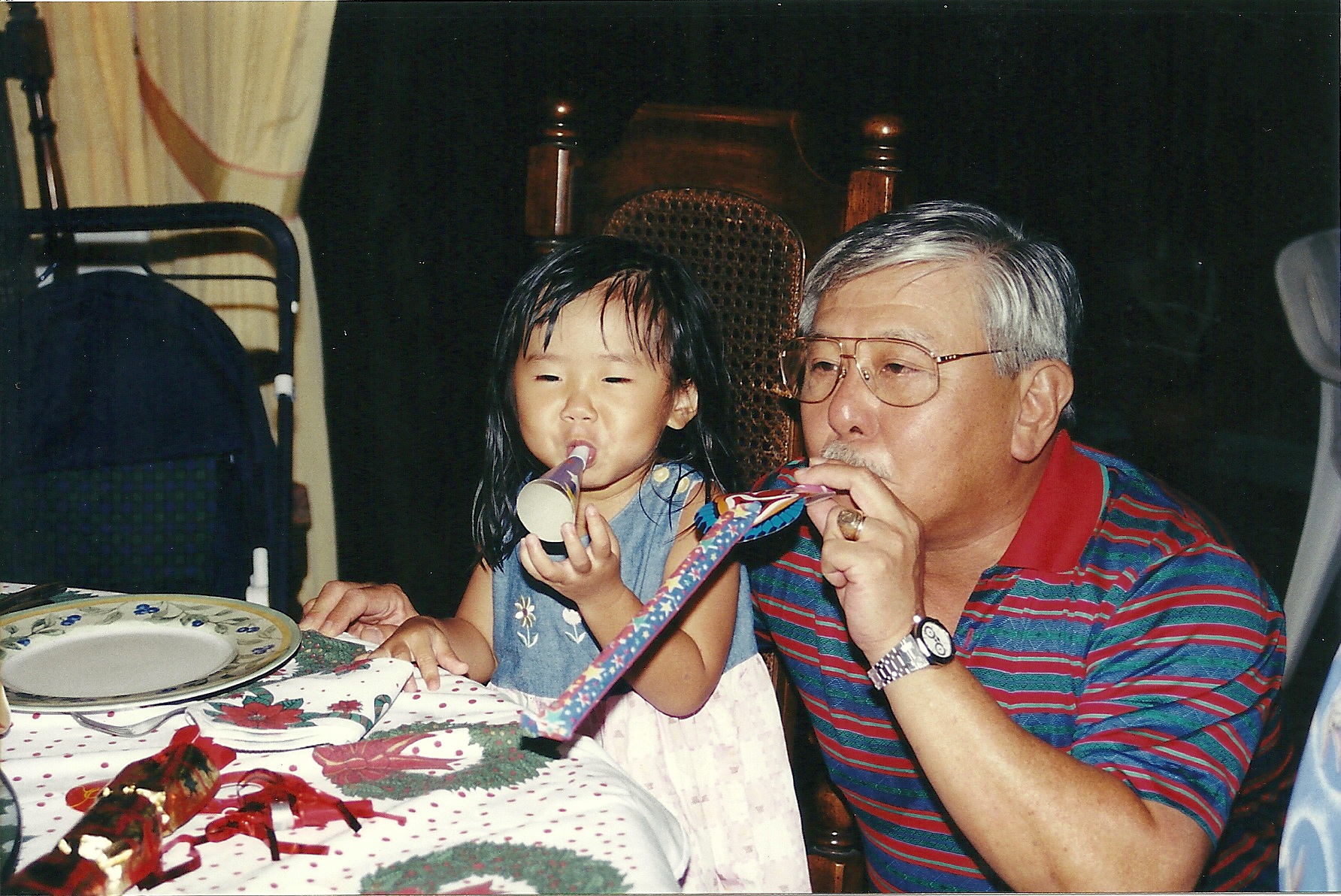
Gen Choo and Dana in December 2000.
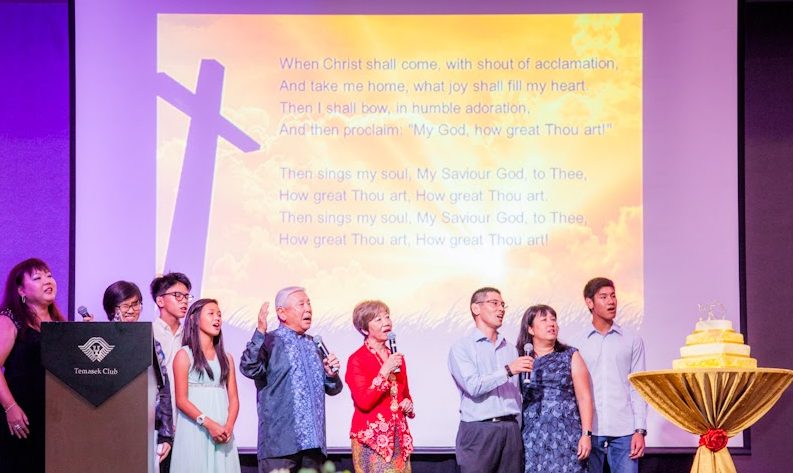
Gen and Mrs Choo and their family praising God with How Great Thou Art, at their 50th wedding anniversary in October 2016.
The seemingly endless string of training, operations and courses did not leave him much time for his two children when they were growing up. He was not present at their births.
“But now my grandchildren are here, I am around, I must influence them to lead them in a godly life.”
“My home must be a proper Christian refuge, a sanctuary for my children and my grandchildren.”
The Choos have two granddaughters and two grandsons.
Gen Choo was already attending church. But he resolved to make sure that “God came first”, and began to seek Him “earnestly”.
“I must lead my life differently, with purpose. And show my family that my home must be a proper Christian refuge, a sanctuary for my children and my grandchildren,” he said.
Mrs Choo noticed the difference in her husband. She noticed he “found a way to adjust his busy schedule to give himself more time to read the Bible and pray”.
“And whenever he had the chance, he would publicly give God the glory and thank Him for His mercies and blessings,” she added.
Was this something that she had been praying for?
“I always say that there’s nothing really we can do. It is all in God’s hands. So whatever happens is His will.”
Will of steel
Gen Choo’s return to God came long before he was diagnosed with tongue cancer in 2017. When it came, he was not afraid.
“I can really put my hand on my heart and say I have never feared because I know that if it is His will, He will be here for me. And He’s been here for me till now.”
The radiation for tongue cancer affected Gen Choo’s ability to swallow, and after going in and out of hospital with pneumonia every time food went down the wrong way, he prayed about it and decided to opt for tube-feeding, he said, pointing to his stomach.
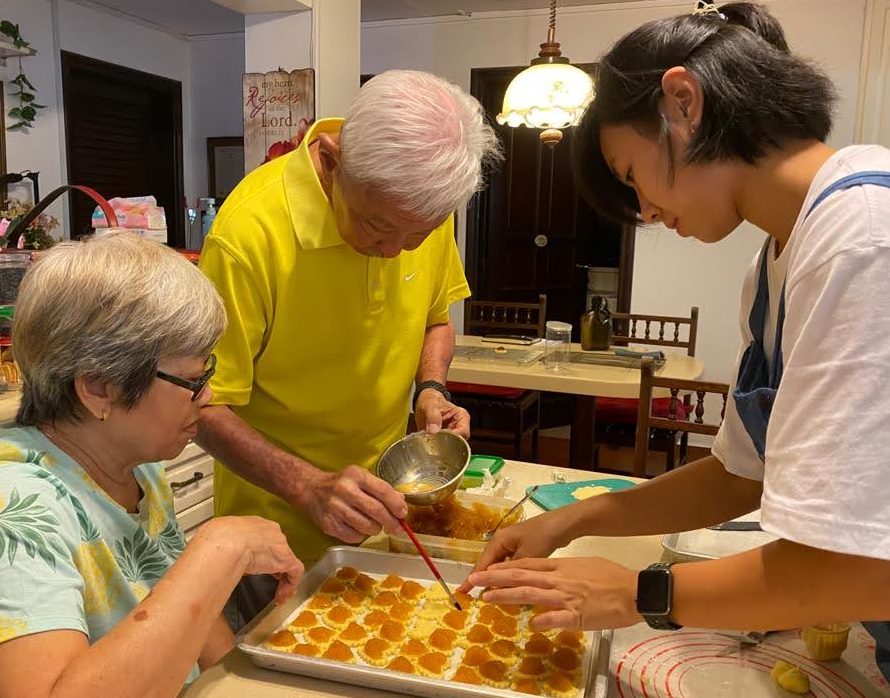
Gen and Mrs Choo making pineapple tarts with their eldest grandchild, Dana.
“God has given me the strength to see you eat, and not feel that I have to eat.”
Is this the same steely will that was evident when he was a cadet?
“In a way. But I say I must learn to go according to God’s will.
“God has given me the strength to see you eat, and not feel that I have to eat.”
Because of the fixed feeding formula, he says his “diet is perfect”.
“Because of that, I don’t take char kway teow, I maintain my weight, I have no hypertension, my diabetes is almost zero.” Potential kidney problems are held at bay.
“God in His grace and mercy has given me an extension of my life. A better state of life. I am well. I am in remission.
“I still pray that He will allow me one day to eat normally. But His will be done.
“When we have family meals, they eat all kinds of things that I love, and I can say, ‘Don’t worry about me. I do not feel deprived’. I enjoy seeing people enjoy.”
Having had prayer warriors pray for him while he was ill, he is now in turn a prayer warrior for others.
Kissing Singapore soil
Gen Choo’s proudest achievement was developing the Singapore Armed Forces to be capable of fighting effectively as one on land, air and sea.
The military’s response to the Laju hijacking in early 1974 had shown that a proper command structure was necessary, he wrote. (A group of Japanese Red Army terrorists attempted to blow up oil tanks at the Shell refinery complex in Pulau Bukom. They failed to cause serious damage but, in their escape, they hijacked the ferry Laju, taking its crew hostage.)
“Fortunately, we have not had to test this out in combat operations, but it has worked very well in complex humanitarian assistance and disaster relief missions,” he wrote, citing Aceh, Sumatra after Boxing Day Tsunami in 2004, as an example.
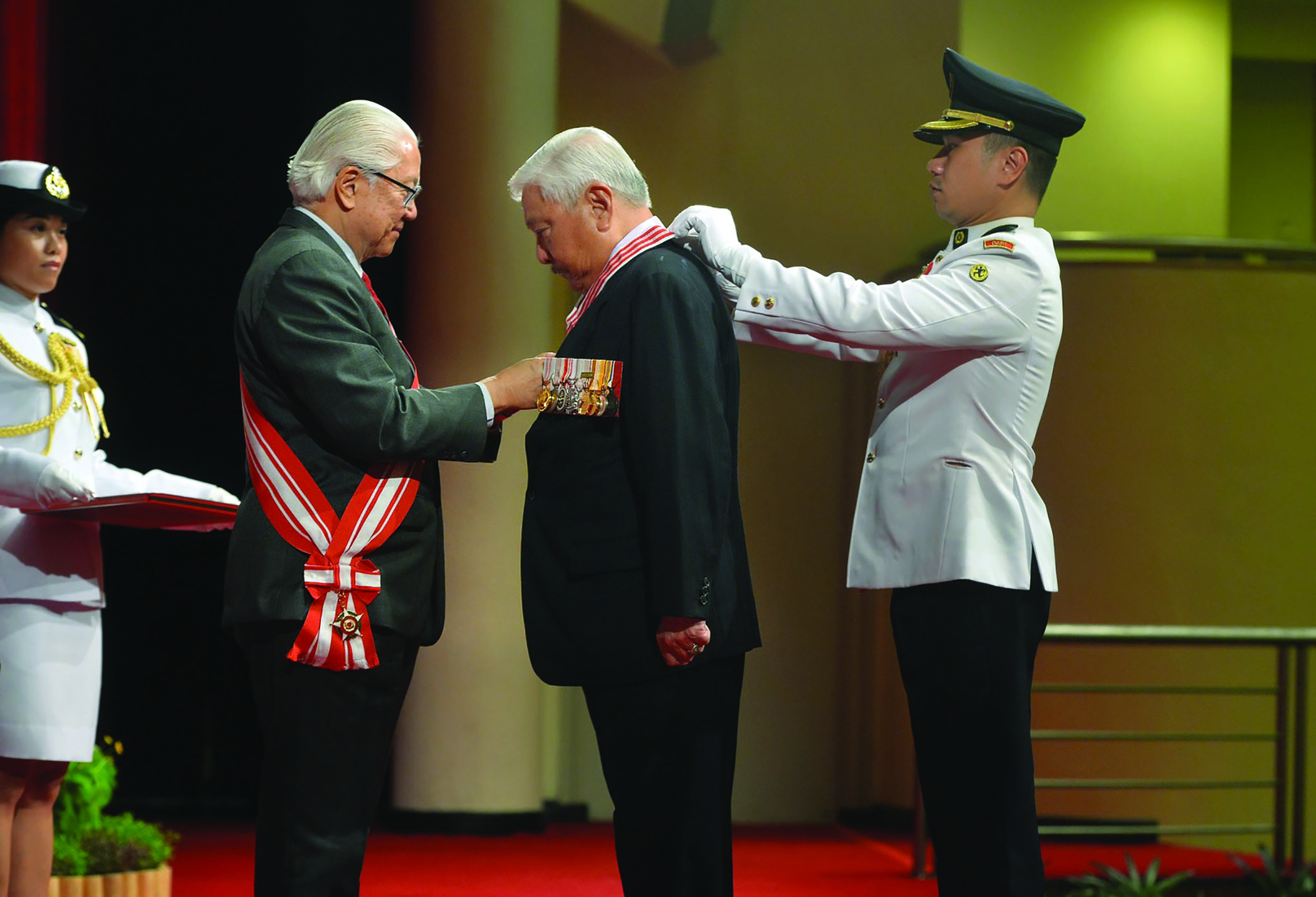
Investiture of the Distinguished Service Order by President Tony Tan Kheng Yam, 2015.
Gen Choo, who built National Service into an institution, has seen soldiers kiss the ground when they step off the plane and set foot onto Singapore soil after training stints overseas. So great is their appreciation for their homeland.
“When soldiers are trained to fight, they are given opportunities to understand why … This provides the soldiers with a moral ballast.”
Looking around at a successful, thriving and secure Singapore today, how does he feel knowing that he had a hand in it?
“In 1965 when Singapore was expelled from Malaysia we were hurled into a time of great uncertainty, politically, economically and our very security was in doubt,” he told Salt&Light.
“I did what other pioneers in my generation did to answer the call to work towards securing Singapore’s survival and sovereignty.
“As a soldier I saw it as my duty to do my part in the defence of the nation.
“Looking back, I am honoured and gratified to have been given the opportunity to play an important part in building up a credible defence force to guarantee the peace, prosperity and security Singapore enjoys today.”
Read Part 2 of Gen Choo’s story in which he honours his wife and spouses of those who serve in the military here.
A Soldier at Heart: A Memoir, $35 (before GST), published by Landmark Books, is available at major bookstores. Gen Choo’s share of proceeds from its sale will be donated equally between his church and the Boys’ Brigade.
This is the fourth story in our National Day series leading up to August 9. Read the other stories in the series below.
RELATED STORIES:
“Without God, I would’ve just been your average Mr Nice Guy”: Olympian and ex-MP Dr Tan Eng Liang
We are an independent, non-profit organisation that relies on the generosity of our readers, such as yourself, to continue serving the kingdom. Every dollar donated goes directly back into our editorial coverage.
Would you consider partnering with us in our kingdom work by supporting us financially, either as a one-off donation, or a recurring pledge?
Support Salt&Light
